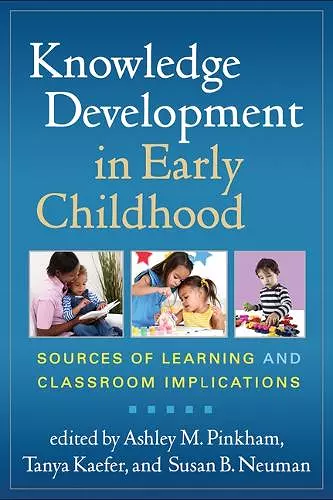Knowledge Development in Early Childhood
Sources of Learning and Classroom Implications
Susan B Neuman editor Ashley M Pinkham editor Tanya Kaefer editor
Format:Hardback
Publisher:Guilford Publications
Published:15th Aug '12
Currently unavailable, our supplier has not provided us a restock date

Synthesizing cutting-edge research from multiple disciplines, this book explores how young children acquire knowledge in the real world and describes practical applications for early childhood classrooms. The breadth and depth of a child's knowledge base are important predictors of later literacy development and academic achievement. Leading scholars describe the processes by which preschoolers and primary-grade students acquire knowledge through firsthand experiences, play, interactions with parents and teachers, storybooks, and a range of media. Chapters on exemplary instructional strategies vividly show what teachers can do to build children's content knowledge while also promoting core literacy skills.
An excellent volume that reviews current research and discusses its implications for practice and policy. Broad in scope, rich in depth, and anchored by contributions from noted scholars, this book is a 'must read' for those teaching and learning about how knowledge is developed and used.--Sharon Lynn Kagan, EdD, Virginia and Leonard Marx Professor of Early Childhood and Family Policy; Co-Director, National Center for Children and Families, Teachers College, Columbia University
Too often, students in early childhood education classes are true believers in either play or direct instruction. This thoughtful volume goes beyond tired debates and moves early childhood education in a fruitful direction by offering sophisticated analyses of relevant recent research on children’s developmental experiences. I would use this book with my doctoral students in applied developmental psychology; the multiple implications for practice also make it suitable for advanced undergraduates interested in teaching young children. In addition, I will recommend this book to research colleagues because of its excellent compilations of empirically based knowledge.--Carollee Howes, PhD, Division of Psychological Studies in Education, University of California, Los Angeles
This book is unique in drawing on scholars from both psychology and education to provide a really wide window onto an important topic. It will be useful for anyone concerned with children’s learning who wants a good overview of current empirical approaches, and also would be ideal for advanced undergraduate and graduate courses in cognitive psychology or education. Perspectives are offered on how children acquire knowledge from a variety of sources--from the testimony of others, to the arts, to specific curricula. The succinct chapters provide a mix of current and classic literature, creating excellent jumping-off points for exploring each area more deeply. A terrific overview.--Angeline Lillard, PhD, Department of Psychology, University of Virginia-The book not only offers a good analysis of relevant research on children’s developmental experiences, but also describes practical applications for those involved in preschool and primary grade level teaching and learning….This book would be valuable for pre-service undergraduates, graduate students, and those wanting an overview of current evidence-based approaches to helping young children acquire knowledge….Recommended. Undergraduate, all levels, and graduate collections.--Choice, 10/16/2013
An excellent volume that reviews current research and discusses its implications for practice and policy. Broad in scope, rich in depth, and anchored by contributions from noted scholars, this book is a 'must read' for those teaching and learning about how knowledge is developed and used.--Sharon Lynn Kagan, EdD, Virginia and Leonard Marx Professor of Early Childhood and Family Policy; Co-Director, National Center for Children and Families, Teachers College, Columbia University
Too often, students in early childhood education classes are true believers in either play or direct instruction. This thoughtful volume goes beyond tired debates and moves early childhood education in a fruitful direction by offering sophisticated analyses of relevant recent research on children’s developmental experiences. I would use this book with my doctoral students in applied developmental psychology; the multiple implications for practice also make it suitable for advanced undergraduates interested in teaching young children. In addition, I will recommend this book to research colleagues because of its excellent compilations of empirically based knowledge.--Carollee Howes, PhD, Division of Psychological Studies in Education, University of California, Los Angeles
This book is unique in drawing on scholars from both psychology and education to provide a really wide window onto an important topic. It will be useful for anyone concerned with children’s learning who wants a good overview of current empirical approaches, and also would be ideal for advanced undergraduate and graduate courses in cognitive psychology or education. Perspectives are offered on how children acquire knowledge from a variety of sources--from the testimony of others, to the arts, to specific curricula. The succinct chapters provide a mix of current and classic literature, creating excellent jumping-off points for exploring each area more deeply. A terrific overview.--Angeline Lillard, PhD, Department of Psychology, University of Virginia- The book not only offers a good analysis of relevant research on children’s developmental experiences, but also describes practical applications for those involved in preschool and primary grade level teaching and learning….This book would be valuable for pre-service undergraduates, graduate students, and those wanting an overview of current evidence-based approaches to helping young children acquire knowledge….Recommended. Undergraduate, all levels, and graduate collections.--Choice, 10/16/2013
ISBN: 9781462504992
Dimensions: unknown
Weight: unknown
270 pages